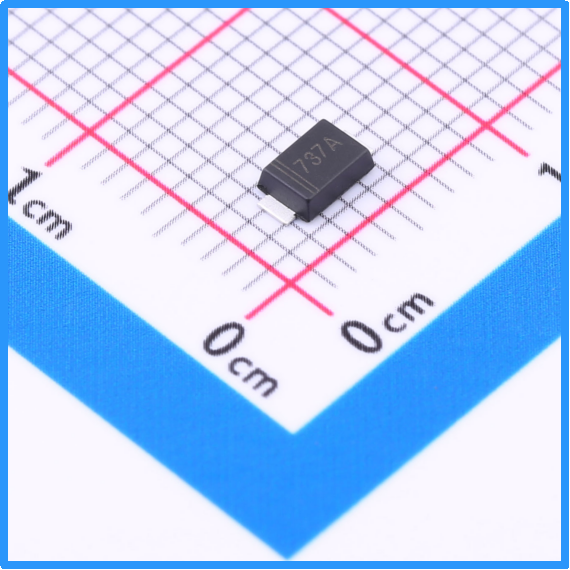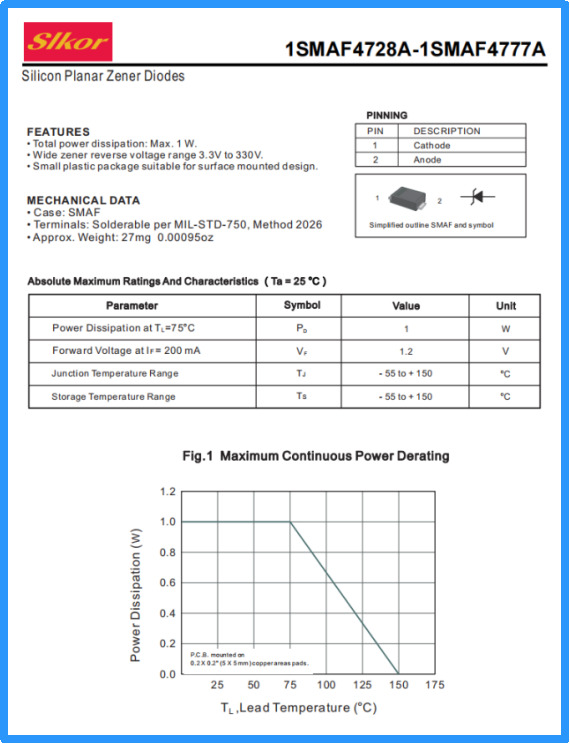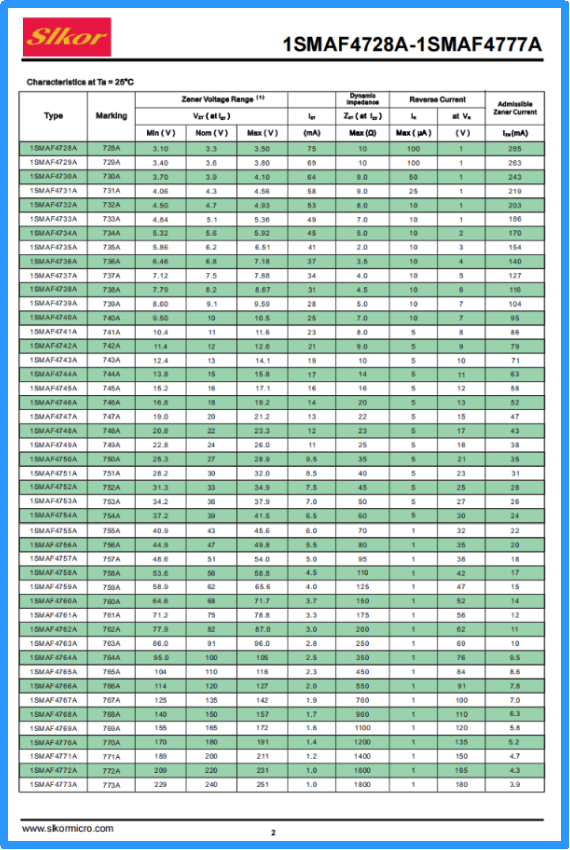【SLKOR semiconductor】Zener Diode 1SMAF4737A: The Optimal Choice for Precision Voltage Regulation and Efficient Applications
In today’s rapidly evolving electronics industry, Zener diodes play a crucial role as key components for circuit protection. Their importance cannot be overstated. Today, we will delve into an exceptional Zener diode—the 1SMAF4737A, which stands out in various applications due to its precise voltage regulation, high power handling capability, and low reverse current characteristics.
Product Overview
The 1SMAF4737A is a high-performance Zener diode specifically designed for electronic devices requiring stable voltage output. Its unique packaging structure and advanced manufacturing processes ensure high reliability and long lifespan. Additionally, this component exhibits excellent temperature stability and electrical performance, allowing it to operate reliably in harsh environments.
Performance Features
Precise Voltage Regulation: The nominal Zener voltage of the 1SMAF4737A is 7.5V, with a voltage range of 7.12V to 7.88V, providing a stable voltage reference that ensures circuit stability and reliability.
Slkor Voltage Regulator Diode 1SMAF4737A product photo
High Power Handling Capability: This device supports a power rating of 1W, making it suitable for a variety of high-power applications.
Slkor Voltage Regulator Diode 1SMAF4737A specification
Low Reverse Current: With a reverse current (Ir) of only 10μA, it helps reduce circuit power consumption and improves overall efficiency.
Parameters of Slkor Voltage Regulator Diode 1SMAF4737A
Case Study
In a high-end smartphone design, engineers selected the 1SMAF4737A as the voltage regulation component in the power management circuit. By precisely controlling the power supply voltage, this device effectively reduced battery power consumption, extending the phone’s standby time. Additionally, during charging, it protects the battery from overcharging and excessive discharging, thereby enhancing battery lifespan.
Evaluating Zener Diode Performance Based on the Datasheet
1. Understanding Electrical Characteristics
● Zener Voltage (Vz):
- Nominal Value: The datasheet typically provides the nominal Zener voltage, which indicates the stable voltage output the device should deliver under normal operating conditions.
- Range: Besides the nominal value, the voltage range (minimum to maximum) reflects the device’s voltage stability under various conditions.
● Power (P):
- Maximum Power Dissipation: The datasheet lists the maximum power dissipation the device can withstand, an important parameter to prevent overheating or damage.
- Power Curve: Sometimes, the datasheet provides a curve relating power to temperature, helping to understand the device’s power handling capability at different temperatures.
● Reverse Current (Ir):
- Maximum Reverse Current: This indicates the maximum current allowed under reverse bias conditions. Low reverse current aids in reducing circuit power consumption.
- Temperature Coefficient: The reverse current may vary with temperature. The datasheet usually provides the temperature coefficient for reverse current to help understand this variation.
2. Analyzing Temperature Characteristics
● Temperature Stability: The datasheet offers information on how parameters like Zener voltage and reverse current change with temperature, providing insights into the device's performance across different temperatures.
● Thermal Resistance (RθJA): This indicates how heat generated inside the device is transferred through its packaging to the surrounding environment. A lower thermal resistance means better heat dissipation capability.
3. Assessing Reliability
● Lifespan: The datasheet may provide information about the expected lifespan of the device, including anticipated operating time and failure rates.
● Environmental Stress Testing: Sometimes, the datasheet includes test results for the device under extreme conditions, such as high temperatures, low temperatures, and humidity. These tests help evaluate the reliability and durability of the component.
● Package Quality: The type and quality of the packaging significantly affect the device’s reliability. The datasheet typically provides information about the packaging materials, processes, and testing standards.
4. Comparing Different Devices
When evaluating multiple Zener diodes, it is essential to compare key parameters from the datasheets. This helps identify the device with the best performance that meets your specific requirements.
5. Practical Application Considerations
In addition to the parameters listed in the datasheet, consider other factors in actual applications, such as PCB layout, thermal conditions, and compatibility with other components. These factors can influence the device's real-world performance.
About Slkor:
Slkor has research and development offices in Busan, South Korea, Beijing, China, and Suzhou, China. Most of the wafer manufacturing and packaging and testing are carried out within China. The company employs and collaborates with individuals and organizations worldwide, with a laboratory for product performance and reliability testing and a central warehouse located at its headquarters in Shenzhen. Slkor has filed for over a hundred invention patents, offers more than 2,000 product models, and serves over ten thousand customers globally. Its products are exported to countries and regions including Europe, the Americas, Southeast Asia, and the Middle East, making it one of the rapidly growing semiconductor companies in recent years. With well-established management systems and streamlined workflows, Slkor has rapidly enhanced the brand awareness and reputation of its "SLKOR" brand through its outstanding quality and standardized services. Its product range includes three major series: diodes, transistors, and power devices, with recent introductions of new products such as Hall elements and analog devices, expanding its presence in sensors, Risc-v microcontrollers, and other product categories.




评论
发表评论